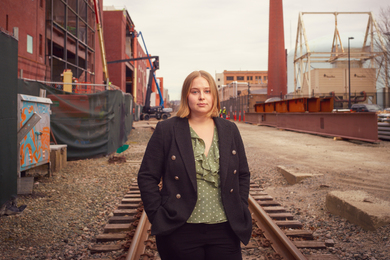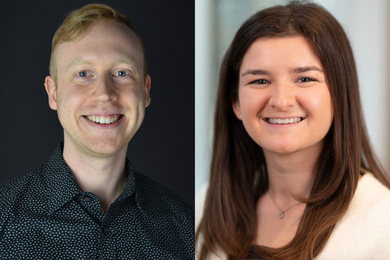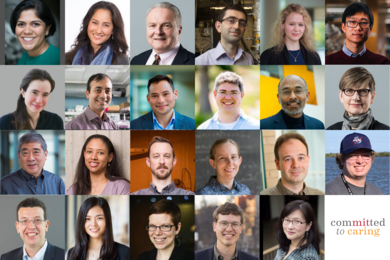MIT President Susan Hockfield and Provost Robert A. Brown announced today the establishment of an Energy Research Council to spearhead efforts to address the world's mounting energy problems.
The council will develop an outline for an Institute-wide response to the global energy crisis by Feb. 1.
The council will be co-chaired by Chevron Professor Robert C. Armstrong, head of the Department of Chemical Engineering, and Professor Ernest J. Moniz of physics and engineering systems and director of energy studies at the Laboratory for Energy and the Environment. Moniz was undersecretary for the U.S. Department of Energy from 1997 to 2001 during the Clinton administration.
"This is arguably the pre-eminent opportunity in the 21st century for bringing science and engineering to bear on human needs," said Moniz. "Fossil fuels make up 85 percent of the world's present energy use, and developing economies will greatly increase their use of fossil fuels to meet their economic and social goals. This need for more energy, coupled with the cumulative effects of carbon dioxide emissions from fossil fuel combustion, have the world running headlong toward climate change. By midcentury, we will have a very real problem and we cannot wait until then to find the technological answers."
Hockfield first announced a new energy initiative in her inaugural address May 6, saying that the Institute had a responsibility to address the world's energy problems. "Over the last 30 years, the words 'sustainable energy' have gotten a little tired--not from overuse but from lack of progress. I believe that the country and the world may now be ready to focus on these matters and it is MIT's responsibility to lead the way," she said.
"Given the global challenges to achieve continued and sustainable delivery of energy in the 21st century, MIT's interest in developing a significant energy initiative is clearly appropriate and timely," said John Darley, director of technology for Shell International Exploration and Production, in a letter to Brown.
Brown appointed the Energy Research Council to lead the planning for the initiative in energy-related research and education--including developing a picture of the current state of MIT energy-related research and expertise; developing a list of promising science and engineering research areas that match global needs and MIT capabilities; and recommending an organizational structure that would facilitate work in these areas.
"MIT is exceptionally well-suited for launching a major initiative in energy research and education because the Institute's strengths in engineering, science, economics and public policy can all be brought to bear on this important problem," said Brown. "Moreover, MIT has a long tradition of major research efforts that cut across disciplinary boundaries in precisely the way an effective energy initiative must work."
Council member Daniel G. Nocera, a professor of chemistry, said, "MIT's 'can do' history of solving big science and technical problems of national and global need is now needed more than ever to deliver the planet its future energy source."
The council will report to the provost and to Alice Gast, vice president for research and associate provost. The 16 council members come from all five of MIT's schools: science, engineering, management, architecture and planning, and humanities, arts and social sciences.
"All the schools will be engaged, because the involvement of economists, architects, urban planners, political scientists and management experts is crucial to make sure that the research results can be rapidly deployed in the real world," Armstrong said.
"Technology is ultimately the solution, but we don't have time to wait decades for it to make its way into the marketplace. Policy is important to help deploy the technologies more quickly," said Moniz, who pointed out that the development of carbonless forms of energy--nuclear and renewables (wind, biomass, hydro and solar)--is crucial. "The reaction to the major energy problems in the '70s--oil shocks and pollutants--did not go to the core structure of the energy industry itself. The confluence of problems we see today--climate change and the energy demands of the emerging economies--are going to require longer-lasting responses."
"Rising standards of living in a growing world population will cause global energy consumption to increase dramatically over the next half century," Nocera said. "A short-term response to this challenge is the use of methane and other petroleum-based fuels as hydrogen sources. However, external factors of economy, environment and security dictate that this energy need be met by renewable and sustainable sources."
The council expects to inform the search for five or six new faculty members whose research will address energy production and use; members will also recommend an administrative structure to facilitate interdisciplinary research on energy problems among other faculty at the Institute. The council also plans to engage the energy industry in its deliberations. "Industry will offer a very important perspective," said Armstrong.
In announcing her initiative, Hockfield observed: "Many MIT faculty are working already on new routes to renewable and sustainable energy. We need to advance this scientific and engineering work, while focusing our efforts and magnifying their impact, through our world-class expertise in economics, architecture and urban planning, political science and management."
Moniz and Armstrong ask that members of the MIT community contact them with ideas for the council's consideration at rca@mit.edu or ejmoniz@mit.edu.
In addition to Armstrong, Moniz and Nocera, council members are Professors Steven Ansolabehere of political science, Angela Belcher of biological engineering and materials science and engineering (MSE); Vladimir Bulovic of electrical engineering and computer science (EECS); Gerbrand Ceder of MSE; John Deutch of chemistry; William Green of chemical engineering; John Heywood of mechanical engineering; Jake Jacoby of MIT's Sloan School; Mujid Kazimi of nuclear engineering; Steven Leeb of EECS; Dale Morgan of earth, atmospheric and planetary sciences; Karen Polenske of urban studies and planning; and Yang Shao-Horn of mechanical engineering.
A version of this article appeared in MIT Tech Talk on June 8, 2005 (download PDF).





